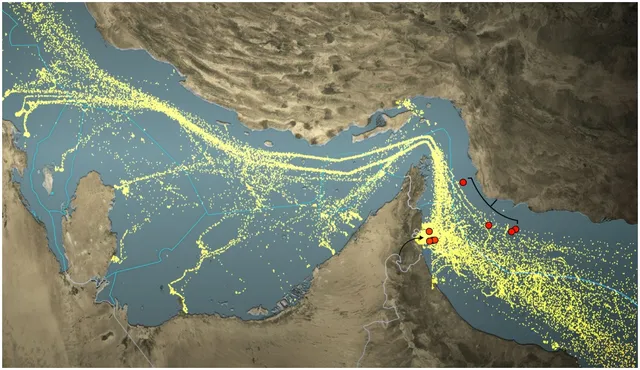- By Shubham Bajpai
- Sun, 22 Jun 2025 07:19 PM (IST)
- Source:JND
The Iranian Parliament on Sunday approved closing the Strait of Hormuz in retaliation to the United States' strikes on its nuclear facilities early morning, the state news media reported. However, the final decision will be takenby the Supreme National Council. The site is a key oil supply route in West Asia.
Strait of Hormuz is one of he most important route for oil and gas supply chains, as one-fifth of such trade of the world passes through it. It comes under the control of two Iranian naval forces: The Iranian Army Navy (IRIN) and the Islamic Revolutionary Guard Corps Navy (IRGCN).
30 miles wide at the narrowest point, it separates Iran from the Arabian Peninsula. It is crucial in the sense that countries like Saudi Arabia, Kuwait, Qatar, Iraq and UAE use this route to export oil across the world. The biggest effect of such a closure would be on Asia.
ALSO READ: Israel Targets Iran's Bushehr, Housing Only Civil Nuclear Site, In Fresh Strikes
How will closure affect India?
Out of 5.5 million barrels per day that India imports, only about 2 million barrels of crude oil come through the strait. Besides, options from Brazil and US are also available. Among them, Brazil provides Brent benchmark crude that India prefers.
The closure, if approved by the Supreme National Security Council of Iran, would trigger a spike in oil and gas prices. The prices of the Brent crude has already risen by 10 per cent since June 13. The current price of the Brent crude is $77 per barrel. This would impact the oil importers across the world, especially in Asia. Like every other country, India would also face the brunt of the rise and supply disruptions, but the diversification in the import basket since the last few years, places India at low risk.
On gas supply, India's main supplier of the Liquified Natura Gas (LNG) is Qatar, followed by the US and UAE. Qatar does not use Strait of Hormuz for the supply of gas to India.
ALSO READ: Operation Midnight Hammer: How US Executed Covert Strikes On Iran’s Key Nuclear Sites
US Strikes on Iran
On Sunday, Pentagon said that the Central Command conducted precision strikes on three Iranian nuclear facility under the Operation Midnight Hammer. US Defence Secretary Pete Hegseth said that the operation devastated the nuclear programme of the West Asian nation. Iran condemned the attack, terming it a violation of international law, the UN Charter and the Nuclear Non-Proliferation Treaty (NPT).
Alleging criminal behaviour by the US, Iranian Foreign Minister Seyed Abbas Araghchi said that the attack will have 'everlasting consequences.' Russian Foreign Minister harshly criticised the operation, labelling it a violation of international law and UN Charter. “The irresponsible decision to bomb the territory of a sovereign state...grossly violates the UN Charter,” Moscow stated.

